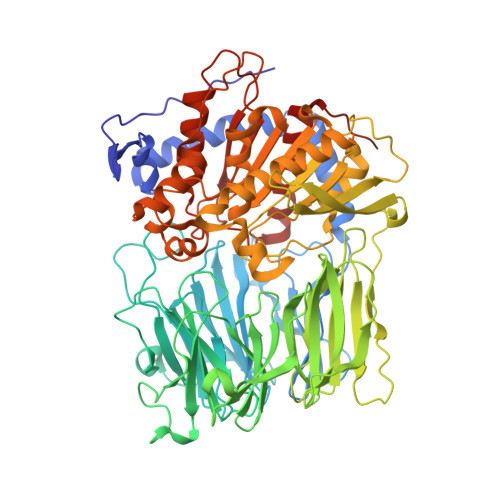Molecular dynamics, crystallography and mutagenesis studies on the substrate gating mechanism of prolyl oligopeptidase.
Kaszuba, K., Rog, T., Danne, R., Canning, P., Fulop, V., Juhasz, T., Szeltner, Z., St Pierre, J.F., Garcia-Horsman, A., Mannisto, P.T., Karttunen, M., Hokkanen, J., Bunker, A.(2012) Biochimie 94: 1398-1411
- PubMed: 22484394
- DOI: https://doi.org/10.1016/j.biochi.2012.03.012
- Primary Citation of Related Structures:
4AMY, 4AMZ, 4AN0, 4AN1 - PubMed Abstract:
Altered prolyl oligopeptidase (PREP) activity is found in many common neurological and other genetic disorders, and in some cases PREP inhibition may be a promising treatment. The active site of PREP resides in an internal cavity; in addition to the direct interaction between active site and substrate or inhibitor, the pathway to reach the active site (the gating mechanism) must be understood for more rational inhibitor design and understanding PREP function. The gating mechanism of PREP has been investigated through molecular dynamics (MD) simulation combined with crystallographic and mutagenesis studies. The MD results indicate the inter-domain loop structure, comprised of 3 loops at residues, 189-209 (loop A), 577-608 (loop B), and 636-646 (loop C) (porcine PREP numbering), are important components of the gating mechanism. The results from enzyme kinetics of PREP variants also support this hypothesis: When loop A is (1) locked to loop B through a disulphide bridge, all enzyme activity is halted, (2) nicked, enzyme activity is increased, and (3) removed, enzyme activity is only reduced. Limited proteolysis study also supports the hypothesis of a loop A driven gating mechanism. The MD results show a stable network of H-bonds that hold the two protein domains together. Crystallographic study indicates that a set of known PREP inhibitors inhabit a common binding conformation, and this H-bond network is not significantly altered. Thus the domain separation, seen to occur in lower taxa, is not involved in the gating mechanism for mammalian PREP. In two of the MD simulations we observed a conformational change that involved the breaking of the H-bond network holding loops A and B together. We also found that this network was more stable when the active site was occupied, thus decreasing the likelihood of this transition.
Organizational Affiliation:
Department of Physics, Tampere University of Technology, Tampere, Finland.


















